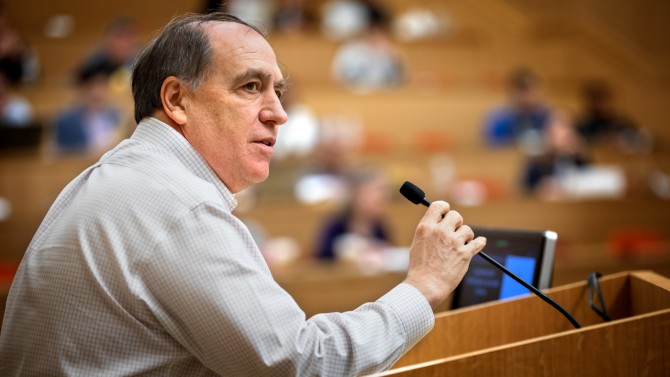New initiative’s inaugural symposium bridges campuses
By Krishna Ramanujan
Last week, researchers and students from the Ithaca and Weill Cornell Medicine campuses met to collaborate and present research related to RNA, genetic material that is essential to coding, decoding, regulation and expression of genes.
A symposium, “RNAs in All Shapes, Sizes and Forms: Markers and Regulators of Health and Disease,” was held Nov. 30-Dec. 1 at Cornell’s College of Veterinary Medicine in Ithaca.
It was the first of several symposia sponsored through the new Academic Integration Initiative (AII), an effort announced this year by Provost Michael Kotlikoff and Provost for Medical Affairs Dr. Augustine Choi, the Stephen and Suzanne Weiss Dean of Weill Cornell Medicine, to link together collaborative research and discovery across Weill Cornell Medicine (WCM), Cornell Tech and Cornell’s main campus in Ithaca.
The symposium included 15 speakers from WCM and the Ithaca campus; welcome addresses from Kotlikoff; Gary Koretzky, WCM vice dean, focused on academic integration; and Lorin Warnick, the Austin O. Hooey Dean of the College of Veterinary Medicine (CVM); a poster session; and moderated breakout sessions to discuss collaborations and interactions between campuses.
“This first symposium was outstanding,” said Koretzky, who is also the Frank H.T. Rhodes Distinguished Professor of Cardiovascular Biology and Genetics. “It achieved all of our goals, including presentation of important science, wonderful presentations by trainees, but most importantly, productive small group faculty sessions where tangible next steps to build intercampus research programs were deliberated.”
“There was a buzz of excitement about how much state-of-the-art work is going on here [in Ithaca] and at Weill Cornell Medicine,” said Paula Cohen, professor of genetics and director of the Center for Reproductive Genomics at CVM. “I think people were surprised about the level of complementarity between research efforts on both campuses, and that drove the excitement.”
The conference format provided one-on-one interactions between faculty, while graduate students and post-doctoral researchers were also encouraged to interact. Breakout sessions were designed to facilitate discussions about next steps and ways to foster more interactions, Cohen said.
She organized the symposium, along with Praveen Sethupathy, associate professor of biomedical sciences at CVM, and Olivier Elemento, director of the Englander Institute for Precision Medicine, associate director of and an associate professor of computational genomics in computational biomedicine in the HRH Prince Alwaleed Bin Talal Bin Abdulaziz Alsaud Institute for Computational Biomedicine, the Walter B. Wriston Research Scholar, and associate professor of physiology and biophysics at WCM.
Aside from future symposia to share work and provide a forum for promoting collaborative research projects, the AII aims to incentivize faculty at all three campuses to seek more National Institutes of Health-funded program grants to support research cores and groups that are hard to fund by other means, and to use such grants to achieve NIH Center of Excellence status for programs; build radical collaboration task forces across campuses through faculty working groups; and increase collaboration of graduate students across all three campuses.
Faculty were invited to submit applications for future AII events. The response has been strong with ideas ranging from machine learning, to health disparities, to antibiotic resistance, Koretzky said. Additional symposia, to be held in both Ithaca and New York City, will be planned for 2018.
Media Contact
Get Cornell news delivered right to your inbox.
Subscribe